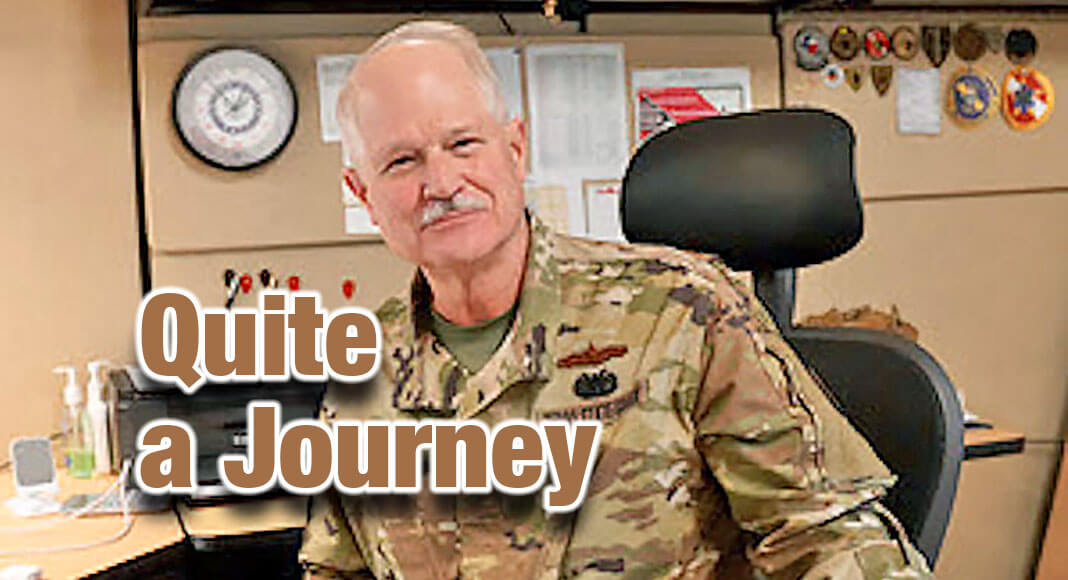
Texas Border Business
By David Brown, 1st Lt., Texas State Guard
AUSTIN (Camp Mabry), Texas – In a career that includes service as a U.S. Naval Officer, military instructor, and multiple leadership posts in the Texas State Guard, Brig. Gen. Joe Cave of Bastrop now has been named Deputy Commanding General (DCG) of the nation’s premier State Guard force.
After 16 years of service in the U.S. Navy, Cave joined the State Guard in 2007, entering as a Commander in the Texas Maritime Regiment (formerly known as “TMAR”, and recently consolidated into the current brigade command structure). Promoted to Captain in 2011, Rear Admiral in 2018, and Brigadier General in 2019, Cave has distinguished himself as Officer-in-Charge of Operation Border Star/Drawbridge, as commander of Marine Rescue Operations during Hurricane Harvey, and as the leader of the 6th Brigade until his recent promotion to DCG.
“(During Hurricane Harvey,) when the Governor said, ‘put in all ships and get everybody out there’, I mean, we were putting everybody out there,” Cave recalls. “That was our first boat type of rescue, but we had trained for it and our troops were extremely professional. Our folks were working around the clock; we were the only ones operating at night, going out and saving people. We were there to serve, and that was quite evident.”
Not only was the bravery and commitment of Texas State Guard troops on full display during Hurricane Harvey, but Cave’s emphasis on military training and education has returned multiple dividends for the people of the State of Texas served by the Guard.
Cave’s approach is “service members first,” says Brigadier General Roger Sheridan, Commander of the 6th Brigade, Texas State Guard. “He gives you the leeway to explore new ideas and be innovative. He’s not overbearing, not over-commanding, but he provides the direction you need to get where you’re going.”
“(Brig. Gen. Cave) is very direct, he’s assertive, and he leads from the front. But there’s also a quiet gentleness about everything he does,” says Master Sgt. Joy Evans, who currently serves as Cave’s aide-de-camp. “You’re not afraid of saying what you really think with him.” Evans says candor and respect are keystones of Cave’s leadership style.
Cave didn’t expect a life in the military. He didn’t even come from a ‘military family’, Cave says. Though he knew his father had been in the Army, it wasn’t until two years ago that he discovered that his dad previously served in the Texas Defense Guard (the predecessor to the Texas State Guard).
Cave smiles as he reflects on his military career, and a moment growing up in Amarillo that changed his life. “I was an underachiever (in school),” Cave says. He recalls a teacher calling him out one day, declaring, “you know what the problem with you is? You’re either going to be an axe murderer, or President of the United States!”
“As I thought about it,”, Cave adds, “what she was truly saying was, ‘you know, you can be as low as you want, or you can be as high as you desire to be’.” It was the seed of a self-improvement mindset that would lead Cave to pursue a BASc in Wildlife Management from West Texas State (now West Texas A&M), and later, an MA in Education Administration.
With few civilian jobs at the time open to people with Cave’s credentials, “it turned out the Navy had a lot of wildlife that needed to be managed,” he says with his characteristically dry wit.
That sense of humor served him well during multiple ‘at seas’ that would take Cave around the world, and occasionally into hairy situations. Cave recalls being off the coast of Lebanon as ballistic splashes peppered the waters around his ship, and being reminded by the petty officer 2nd class manning the gun director that only a quarter inch of aluminum stood between him and – grim. Later, on a mission thru the Straits of Hormuz during a time when enemy ‘suicide attack boats’ were taking runs at American ships, “they would come out and make a run for you, and we’d all have weapons to bear,” he says. “I remember saying, ‘wow, this is going to get very real, very quick!’, but fortunately, they decided to veer off.”
After 16 years in the U.S. Navy, Cave retired at the rank of Commander, and moved into education, working as Senior Naval Science Instructor with the Navy’s Junior Reserve Officer Training Corps (NJROTC). He was assigned to various schools running leadership courses and camps before being asked to join the State Guard.
These days, as the first officer from the top in the Texas State Guard command chain, there’s much more on his plate, notes Evans, his aide-de-camp. “Now I do sometimes want to put a bell on him – where’s my boss?!” jokes Evans.
No worries. Cave isn’t one to lose sight of what’s important.
“As our world continues to change, the demands upon our federal soldiers are going to increase, the world is continuing to become, in my opinion, an increasingly dangerous place. Well, if all the ‘what ifs’ come into play, we are going to be asked to step up,” Cave notes. While members of the Texas State Guard are often called by local civil officials to aid in search-and-rescue and other emergency missions statewide, its additional duties include assisting Texas (Army and Air) National Guard forces as needed and providing additional security on the home front.
“Our political leadership definitely sees the worth in the Texas State Guard, as many times this year we’ve been called down to the capitol to provide information. They ask the right questions, and sometimes they get kind of tickled when we answer the question, “Well, how much did y’all get paid?”
While Texas State Guard soldiers do receive a stipend for State Active Duty missions in addition to a range of benefits, troops commit to attend drills and undergo constant military training without pay. Most Guard members will tell you they chose to join the Texas State Guard out of a love of public service, and a love of Texas.
As Deputy Commanding General of the Texas State Guard, Cave exemplifies the spirit of both.
Information Source: Texas Military Department














